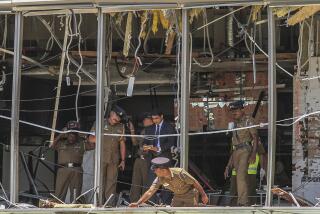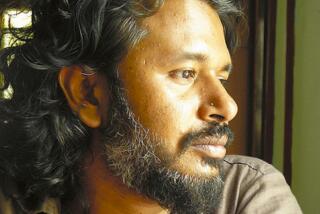Death Squads’ Terrorism Becomes Sri Lanka Scandal
- Share via
MORATUWA, Sri Lanka — After a yearlong reign of terror by government-backed death squads that emptied villages of young men and littered Sri Lanka’s beaches with corpses, the fishermen of Moratuwa were hardly surprised when they spotted yet another body floating 250 yards offshore recently.
But this time, it was different. When the fishermen got the body to shore, they knew that this was not just another anonymous suspect in the government’s brutal counterinsurgency campaign.
It was Richard De Zoysa, nationally known television newscaster and film actor, who most recently had been writing exposes on the abuses of Sri Lanka’s death squads.
Just that morning, Sri Lankan radio had announced that a group of armed men, some in police uniform, had abducted the 31-year-old journalist from his mother’s home in the capital of Colombo the previous day. And now, the Indian Ocean fishermen recognized De Zoysa’s body, with two bullet wounds in the head, as something that did not fit the pattern of their coastal killing ground.
In the weeks that have followed De Zoysa’s murder in late February, his case has mushroomed into a national scandal reaching to the highest levels of government. Diplomats, lawyers and even members of Colombo’s powerful ruling elite now say his death has come to symbolize a terrifying legacy of death squads gone awry.
“What the state unleashed a year ago we describe as counterterror, and it apparently succeeded in breaking the back of an equally brutal insurgency,” said Colombo attorney Batty Weerakoon, who is representing De Zoysa’s mother.
“But once it was broken, the people began to wonder why these killings should continue. A year ago, the human rights violations were directed very specifically at subversives and terrorists. Today, they are directed at all kinds of opposition. Anybody who criticizes the people at the top is running a big risk.”
Just 10 days after De Zoysa’s murder, for example, a death squad in another town near Colombo shot, set aflame and killed 13 members of the Sri Lanka Freedom Party, the main opposition to President Ranasinghe Premadasa’s ruling party. Several policemen have been arrested in the case.
Elsewhere, local opposition leaders have been assassinated individually or have complained of persistent telephoned death threats.
Five human rights lawyers investigating the activities of hit squads or representing victims’ families have been murdered. Weerakoon himself said this week: “Now, even I don’t know what a fellow might do to me. I am also terrorized.”
Already the De Zoysa murder has had a chilling effect on the media as well. At least four journalists have fled the country under death threats, and those who remain say they are consciously avoiding any subject critical of the government.
The most recent activity of the death squads emerges against a backdrop that is as gruesome as the present record.
In the southern regions of this island nation--once so idyllic that Mark Twain, a visitor in the 19th Century, nicknamed it Serendip--there are entire villages where only children and the elderly remain. All of the men between 15 and 35 have disappeared.
Many were summarily executed under continuing emergency laws that permit security forces to kill suspects without trial or identification. Others remain in overflowing military jails, where they’re being held without charges or notification of their relatives.
At camps throughout the south, where the grass-roots insurgency by the People’s Liberation Army began in earnest three years ago, scores of mothers can still be seen pressing up against the barbed wire, waiting for word of their sons, husbands or fathers.
The leftist insurgents also contributed heavily to the horror. Before their leader, Rohana Wijeweera, and his top lieutenants were captured and quickly executed by security forces late last year, guerrilla units routinely bound suspected government informants in village clearings and beheaded them as villagers were forced to watch.
They forced shopkeepers, bus drivers and rickshaw pullers to observe general strikes by torturing and killing those who refused to comply, often paralyzing the nation and its economy.
Until the government unleashed its death squads a year ago, most analysts agreed that the insurgents were on the verge of taking power by force.
The death toll on both sides in the past year alone is staggering. The most conservative estimate, by diplomatic observers, is 8,000, in a nation of just 15 million. Human rights workers put it as high as 30,000.
Political analyst Neelan Tiruchelvam, borrowing a quote from Czechoslovak President Vaclav Havel, said: “Society in Sri Lanka is now morally flawed. It has lost its capacity to distinguish between right and wrong.”
It was in this context that the group of heavily armed men came to Manorani Saravanamuttu’s modest Colombo home and demanded her son, De Zoysa, just after 3 a.m. on Feb. 18.
Despite his relative youth, De Zoysa, a veteran journalist, knew all the top Sri Lankan politicians personally--even President Premadasa. He was employed full-time as a correspondent of the Rome-based Inter Press Service, an international news agency focused on a Third World market. But he was also an outspoken and respected actor and a fixture in Colombo’s artistic community.
As a journalist, De Zoysa had written Inter Press dispatches highly critical of the death squads, among them an article last August entitled, “Sri Lanka: Nearing a Human Rights Apocalypse.” But he also had worked on documentary films favorable to the government, and friends now say they believe it was De Zoysa’s ties to the theater world, as much as his journalistic work, that made him a target for death.
The word was out that De Zoysa had helped produce a satirical play that was savagely critical of Premadasa, who has been so sensitive to personal criticism that he has barred at least two foreign journalists from Sri Lanka simply for writing about his low-caste roots.
The controversial play was called “Who Is He and What Is He Doing?” But the curtain never went up. The night before its February debut, producer Lakshman Perera, an openly critical member of Premadasa’s ruling party, disappeared and is now believed to have been murdered.
It was the next morning that the armed men appeared at De Zoysa’s mother’s front door, demanding to see her son.
“I’m not a fool,” Saravanamuttu, a prominent physician and daughter of a former Sri Lankan diplomat, told The Times in an interview this week. “I’m a doctor. I’ve lived a long time. I’ve worked with police on investigations.
“(One) man was in full police uniform, but I demanded to see some identification. He said, ‘I.D. cards aren’t necessary. If you don’t let us in, we’ll shoot you.’ I had no choice, and minutes later, they took Richard away.”
Saravanamuttu said that she, her houseboy and neighbors gave detailed descriptions of at least two of the men to police, and the houseboy gave the license number of the jeep used to take De Zoysa away. But she and her lawyer, Weerakoon, charge that police have done nothing to trace them.
“They just want to cover this whole thing up,” Weerakoon said. “It’s right from the top.”
Police Supt. Gamini Perera, Colombo’s chief of detectives and the head of the De Zoysa investigation, insists that his men are trying to find the killers, although he denies that the witnesses gave police any physical descriptions.
Asked whether he has been under political pressure in the case, Perera declared: “Absolutely not.”
President Premadasa, who has been the focus of popular speculation about the case, has cast himself as a friend and sympathizer of De Zoysa’s family.
Saravanamuttu said she will keep pressing. “I’m just not going to give this up without a fight,” she vowed, saying that she will continue her court battle to push the police investigation “no matter where it leads.”
Then her anger subsided for a moment, and she added, “There is another side to this, you know. I really am very lucky.
“In fact, I feel I’m the luckiest mother in Sri Lanka, because at least I got my son’s body back. I could give Richard a decent funeral and, as hard as this sounds, at least I know he’s really dead.
“There are thousands of other mothers out there who just don’t know, who are still simply sitting there and waiting.”
More to Read
Sign up for Essential California
The most important California stories and recommendations in your inbox every morning.
You may occasionally receive promotional content from the Los Angeles Times.













